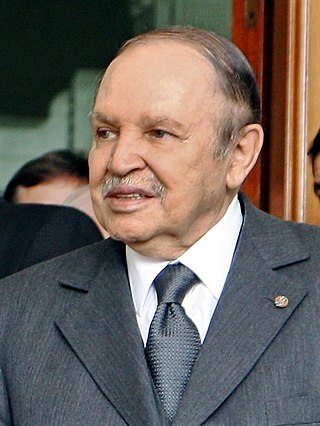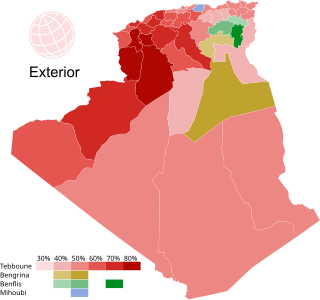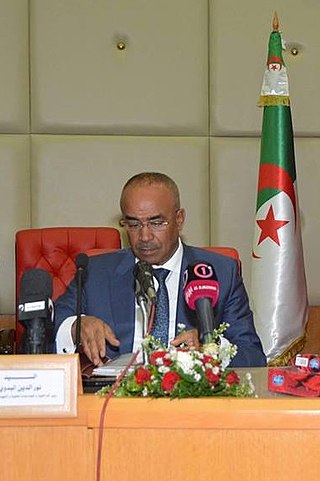Contents
| |||||
| Decades: | |||||
|---|---|---|---|---|---|
| See also: | |||||
| |||||
| Decades: | |||||
|---|---|---|---|---|---|
| See also: | |||||

The president of the People's Democratic Republic of Algeria is the head of state and chief executive of Algeria, as well as the commander-in-chief of the Algerian People's National Armed Forces.

Abdelaziz Bouteflika was an Algerian politician and diplomat who served as the seventh president of Algeria from 1999 to his resignation in 2019.

Ahmed Ouyahia is an Algerian politician who was Prime Minister of Algeria four times. A career diplomat, he also served as Minister of Justice, and he was one of the founders of the Democratic National Rally (RND) as well as the party's secretary-general. He is considered by Western observers to be close to the military of Algeria and a member of the "eradicator" faction in the 1990s civil war against Islamist militants. Ouyahia resigned as prime minister in March 2019 following President Bouteflika's announcement that he would not seek reelection, and Ouyahia was arrested in June 2019 for crimes related to corruption. He was later convicted and is currently serving 19 years in jail.

Abdelaziz Belkhadem is an Algerian politician who was Prime Minister of Algeria from 2006 to 2008. He was also Secretary-General of the National Liberation Front (FLN). Belkhadem served as Minister of Foreign Affairs from 2000 to 2005 and Personal Representative of President Abdelaziz Bouteflika from 2005 to 2006; after serving as Prime Minister from 2006 to 2008, he was again appointed as Personal Representative of the Head of State in 2008.

Presidential elections were held in Algeria on 15 April 1999. Abdelaziz Bouteflika was elected with 73.8% of the vote after the other six candidates withdrew on the eve of the elections.
Events from the year 2011 in Algeria

Parliamentary elections were held in Algeria on 10 May 2012. The incumbent coalition, consisting of the National Liberation Front (FLN) of President Abdelaziz Bouteflika and the National Rally for Democracy (RND) of Prime Minister Ahmed Ouyahia, held on to power after winning a majority of seats. The Islamist parties of the Green Algeria Alliance lost seats.

Abdelmalek Sellal is an Algerian politician who was Prime Minister of Algeria from 3 September 2012 to 13 March 2014 when he took a leave of office to support President Abdelaziz Bouteflika's re-election campaign and again from April 2014 to May 2017.

Tayeb Belaiz was an Algerian jurist and politician who held different cabinet posts. He served as Algeria's minister of justice between 2004 and 2012 and minister of interior between 2013 and 2015.

Presidential elections were held in Algeria on 17 April 2014. Incumbent President Abdelaziz Bouteflika was re-elected with 82% of the vote. Issues in the campaign included a desire for domestic stability after the bloody civil war of the 1990s, the state of the economy, the frail health of the 15 year incumbent and 77-year-old president whose speech was "slurred and inaudible" in his only public outing during the campaign, and the less-than-wholehearted support given the president by the normally united and discrete ruling class.

Ahmed Gaid Salah was a senior leader in the Algerian People's National Army. In 2004, he was appointed by then-President Abdelaziz Bouteflika to the position of chief of staff of the army. On 15 September 2013, he was appointed Deputy Minister of Defense. Gaid Salah was promoted to the rank of general in 1993. He was married and father of seven children. Gaid Salah served as Algeria's de facto leader in 2019.

Abdelmadjid Tebboune is an Algerian politician currently serving as the President of Algeria since December 2019 and as Minister of Defence.

Presidential elections were held in Algeria on 12 December 2019. The election had originally been scheduled for 18 April, but was postponed due to sustained weekly protests against plans by the incumbent president Abdelaziz Bouteflika to run for a fifth term. Bouteflika resigned on 2 April and Abdelkader Bensalah was elected acting president by parliament a week later. On 10 April the election was rescheduled for 4 July. On 2 June the Constitutional Council postponed the elections again, citing a lack of candidates. A new electoral authority, Autorité nationale indépendante des élections (ANIE), was created in mid-September as an alternative to the existing Haute instance indépendante de surveillance des élections (HIISE) defined by the 2016 constitution. The election was rescheduled for 12 December 2019 and ANIE, of disputed constitutional validity, announced five valid candidates on 2 November. In their 200000 strong protest on 1 November, Algerian protestors rejected the 12 December election and called for a radical change in the system to take place first. The Forces of the Democratic Alternative (FDA) alliance and the Justice and Development Front also called for boycotting the 12 December election, and the FDA called for creating a constituent assembly.
The Algerian Academy of the Amazigh Language is the pre-eminent Algerian council for matters pertaining to the Amazigh language. The academy was officially established on December 27, 2017, by the former president of Algeria Abdelaziz Bouteflika.

The 2019–2021 Algerian protests, also called Revolution of Smiles or Hirak, began on 16 February 2019, six days after Abdelaziz Bouteflika announced his candidacy for a fifth presidential term in a signed statement. These protests, without precedent since the Algerian Civil War, were peaceful and led the military to insist on Bouteflika's immediate resignation, which took place on 2 April 2019. By early May, a significant number of power-brokers close to the deposed administration, including the former president's younger brother Saïd, had been arrested.

Noureddine Bedoui is an Algerian politician. He was Prime Minister of Algeria from 11 March 2019 to 19 December 2019.

Abdelkader Bensalah was an Algerian politician.
Saïd Bouteflika is an Algerian politician and academic. He is the brother and was a special adviser of Abdelaziz Bouteflika in his former role as President of Algeria, on whom he would have had "considerable influence", especially after the president suffered a serious stroke in 2013. He was also an assistant professor at the University of Science and Technology Houari Boumediene (USTHB).

A constitutional referendum was held in Algeria on 1 November 2020. The subject of the referendum was a revision of the Algerian constitution, and it follows a series of protests known as Hirak.
The first Djerad government is the forty-sixth government of the People's Democratic Republic of Algeria. It is a government formed by Abdelaziz Djerad on 2 January 2020 under President Abdelmadjid Tebboune.